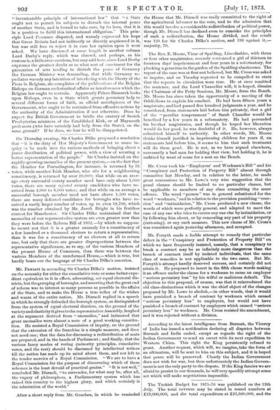Mr. Fawcett in seconding Sir Charles Dilke's motion, insisted on
the necessity for either the cumulative vote or some better expe- dient equivalent to it in effect, advocating, not equal electoral dis- tricts, but the grouping of boroughs, and assertingthat the great end of reform was to interest as many persons as possible in the affairs of the State, and to make the House a true reflex of the wishes and wants of the entire nation. Mr. Disraeli replied in a speech in which he strongly defended the borough system, as distinguished from the system of equal electoral districts, on the ground of the variety and elasticity it gives to the representative Assembly, laughed at the argument derived from "anomalies," and intimated that great anomalies were almost a note of a good working constitu- tion. He resisted a Royal Commission of inquiry, on the ground that the extension of the franchise is a simple measure, and does not need one; that the data for discussing a redistribution of seats are prepared, and in the hands of Parliament ; and finally, that the various fancy modes of voting (minority principles, cumulative votes, and the rest) should be discussed by intellectual writers till the nation has made up its mind about them, and not left to the tender mercies of a Royal Commission. "We are to have a Royal Commission for the purpose of discovering which of these schemes is the least devoid of practical genius." "It is not well," concluded Mr. Disraeli, "to surrender, for what may be, after all, the vagary of philosophers, a Parliamentary system which has raised this country to the highest glory, and which certainly is the admiration of the world."


































 Previous page
Previous page